
The Project Gutenberg EBook of Adventures of Huckleberry Finn, Part 7
by Mark Twain (Samuel Clemens)
This eBook is for the use of anyone anywhere at no cost and with
almost no restrictions whatsoever. You may copy it, give it away or
re-use it under the terms of the Project Gutenberg License included
with this eBook or online at www.gutenberg.org
Title: Adventures of Huckleberry Finn, Part 7
Chapters XXXI. to XXXV.
Author: Mark Twain (Samuel Clemens)
Release Date: June 28, 2004 [EBook #7106]
Language: English
Character set encoding: ISO-8859-1
*** START OF THIS PROJECT GUTENBERG EBOOK HUCKLEBERRY FINN, PART 7. ***
Produced by David Widger



|
CHAPTER XXXI. CHAPTER XXXII. CHAPTER XXXIII. CHAPTER XXXIV. CHAPTER XXXV. |

EXPLANATORY
IN this book a number of dialects are used, to wit: the Missouri negro dialect; the extremest form of the backwoods Southwestern dialect; the ordinary "Pike County" dialect; and four modified varieties of this last. The shadings have not been done in a haphazard fashion, or by guesswork; but painstakingly, and with the trustworthy guidance and support of personal familiarity with these several forms of speech.
I make this explanation for the reason that without it many readers would suppose that all these characters were trying to talk alike and not succeeding.
THE AUTHOR.
Scene: The Mississippi Valley Time: Forty to fifty years ago
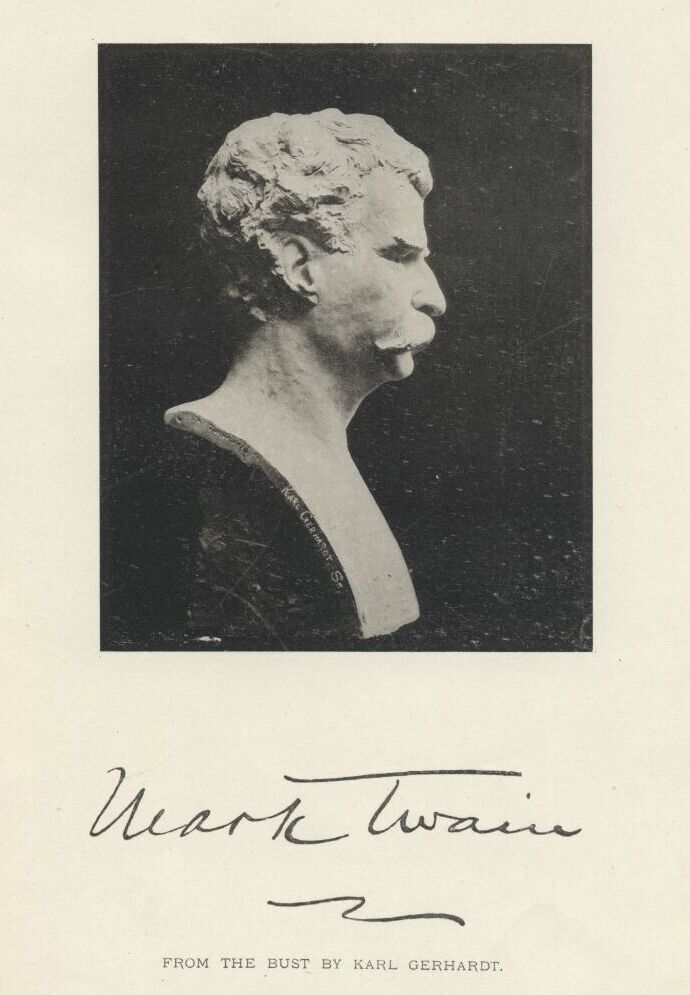
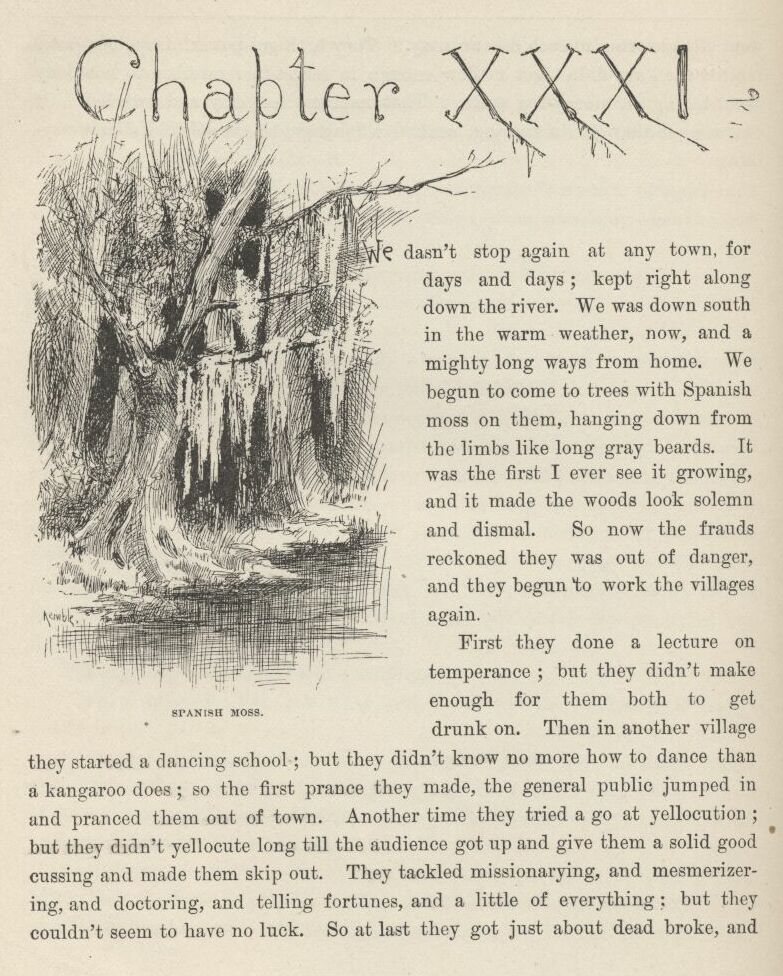
CHAPTER XXXI.
WE dasn't stop again at any town for days and days; kept right along down the river. We was down south in the warm weather now, and a mighty long ways from home. We begun to come to trees with Spanish moss on them, hanging down from the limbs like long, gray beards. It was the first I ever see it growing, and it made the woods look solemn and dismal. So now the frauds reckoned they was out of danger, and they begun to work the villages again.
First they done a lecture on temperance; but they didn't make enough for them both to get drunk on. Then in another village they started a dancing-school; but they didn't know no more how to dance than a kangaroo does; so the first prance they made the general public jumped in and pranced them out of town. Another time they tried to go at yellocution; but they didn't yellocute long till the audience got up and give them a solid good cussing, and made them skip out. They tackled missionarying, and mesmerizing, and doctoring, and telling fortunes, and a little of everything; but they couldn't seem to have no luck. So at last they got just about dead broke, and laid around the raft as she floated along, thinking and thinking, and never saying nothing, by the half a day at a time, and dreadful blue and desperate.
And at last they took a change and begun to lay their heads together in the wigwam and talk low and confidential two or three hours at a time. Jim and me got uneasy. We didn't like the look of it. We judged they was studying up some kind of worse deviltry than ever. We turned it over and over, and at last we made up our minds they was going to break into somebody's house or store, or was going into the counterfeit-money business, or something. So then we was pretty scared, and made up an agreement that we wouldn't have nothing in the world to do with such actions, and if we ever got the least show we would give them the cold shake and clear out and leave them behind. Well, early one morning we hid the raft in a good, safe place about two mile below a little bit of a shabby village named Pikesville, and the king he went ashore and told us all to stay hid whilst he went up to town and smelt around to see if anybody had got any wind of the Royal Nonesuch there yet. ("House to rob, you MEAN," says I to myself; "and when you get through robbing it you'll come back here and wonder what has become of me and Jim and the raft—and you'll have to take it out in wondering.") And he said if he warn't back by midday the duke and me would know it was all right, and we was to come along.
So we stayed where we was. The duke he fretted and sweated around, and was in a mighty sour way. He scolded us for everything, and we couldn't seem to do nothing right; he found fault with every little thing. Something was a-brewing, sure. I was good and glad when midday come and no king; we could have a change, anyway—and maybe a chance for THE chance on top of it. So me and the duke went up to the village, and hunted around there for the king, and by and by we found him in the back room of a little low doggery, very tight, and a lot of loafers bullyragging him for sport, and he a-cussing and a-threatening with all his might, and so tight he couldn't walk, and couldn't do nothing to them. The duke he begun to abuse him for an old fool, and the king begun to sass back, and the minute they was fairly at it I lit out and shook the reefs out of my hind legs, and spun down the river road like a deer, for I see our chance; and I made up my mind that it would be a long day before they ever see me and Jim again. I got down there all out of breath but loaded up with joy, and sung out:
"Set her loose, Jim! we're all right now!"
But there warn't no answer, and nobody come out of the wigwam. Jim was gone! I set up a shout—and then another—and then another one; and run this way and that in the woods, whooping and screeching; but it warn't no use—old Jim was gone. Then I set down and cried; I couldn't help it. But I couldn't set still long. Pretty soon I went out on the road, trying to think what I better do, and I run across a boy walking, and asked him if he'd seen a strange nigger dressed so and so, and he says:
"Yes."
"Whereabouts?" says I.
"Down to Silas Phelps' place, two mile below here. He's a runaway nigger, and they've got him. Was you looking for him?"
"You bet I ain't! I run across him in the woods about an hour or two ago, and he said if I hollered he'd cut my livers out—and told me to lay down and stay where I was; and I done it. Been there ever since; afeard to come out."
"Well," he says, "you needn't be afeard no more, becuz they've got him. He run off f'm down South, som'ers."
"It's a good job they got him."
"Well, I RECKON! There's two hunderd dollars reward on him. It's like picking up money out'n the road."
"Yes, it is—and I could a had it if I'd been big enough; I see him FIRST. Who nailed him?"
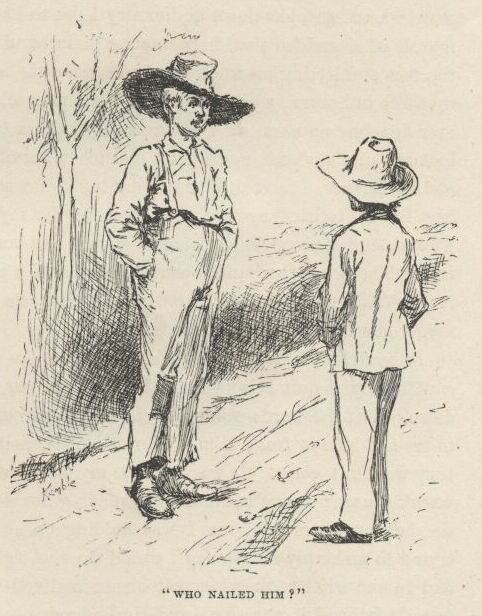
"It was an old fellow—a stranger—and he sold out his chance in him for forty dollars, becuz he's got to go up the river and can't wait. Think o' that, now! You bet I'D wait, if it was seven year."
"That's me, every time," says I. "But maybe his chance ain't worth no more than that, if he'll sell it so cheap. Maybe there's something ain't straight about it."
"But it IS, though—straight as a string. I see the handbill myself. It tells all about him, to a dot—paints him like a picture, and tells the plantation he's frum, below NewrLEANS. No-sirree-BOB, they ain't no trouble 'bout THAT speculation, you bet you. Say, gimme a chaw tobacker, won't ye?"
I didn't have none, so he left. I went to the raft, and set down in the wigwam to think. But I couldn't come to nothing. I thought till I wore my head sore, but I couldn't see no way out of the trouble. After all this long journey, and after all we'd done for them scoundrels, here it was all come to nothing, everything all busted up and ruined, because they could have the heart to serve Jim such a trick as that, and make him a slave again all his life, and amongst strangers, too, for forty dirty dollars.
Once I said to myself it would be a thousand times better for Jim to be a slave at home where his family was, as long as he'd GOT to be a slave, and so I'd better write a letter to Tom Sawyer and tell him to tell Miss Watson where he was. But I soon give up that notion for two things: she'd be mad and disgusted at his rascality and ungratefulness for leaving her, and so she'd sell him straight down the river again; and if she didn't, everybody naturally despises an ungrateful nigger, and they'd make Jim feel it all the time, and so he'd feel ornery and disgraced. And then think of ME! It would get all around that Huck Finn helped a nigger to get his freedom; and if I was ever to see anybody from that town again I'd be ready to get down and lick his boots for shame. That's just the way: a person does a low-down thing, and then he don't want to take no consequences of it. Thinks as long as he can hide, it ain't no disgrace. That was my fix exactly. The more I studied about this the more my conscience went to grinding me, and the more wicked and low-down and ornery I got to feeling. And at last, when it hit me all of a sudden that here was the plain hand of Providence slapping me in the face and letting me know my wickedness was being watched all the time from up there in heaven, whilst I was stealing a poor old woman's nigger that hadn't ever done me no harm, and now was showing me there's One that's always on the lookout, and ain't a-going to allow no such miserable doings to go only just so fur and no further, I most dropped in my tracks I was so scared. Well, I tried the best I could to kinder soften it up somehow for myself by saying I was brung up wicked, and so I warn't so much to blame; but something inside of me kept saying, "There was the Sunday-school, you could a gone to it; and if you'd a done it they'd a learnt you there that people that acts as I'd been acting about that nigger goes to everlasting fire."
It made me shiver. And I about made up my mind to pray, and see if I couldn't try to quit being the kind of a boy I was and be better. So I kneeled down. But the words wouldn't come. Why wouldn't they? It warn't no use to try and hide it from Him. Nor from ME, neither. I knowed very well why they wouldn't come. It was because my heart warn't right; it was because I warn't square; it was because I was playing double. I was letting ON to give up sin, but away inside of me I was holding on to the biggest one of all. I was trying to make my mouth SAY I would do the right thing and the clean thing, and go and write to that nigger's owner and tell where he was; but deep down in me I knowed it was a lie, and He knowed it. You can't pray a lie—I found that out.
So I was full of trouble, full as I could be; and didn't know what to do. At last I had an idea; and I says, I'll go and write the letter—and then see if I can pray. Why, it was astonishing, the way I felt as light as a feather right straight off, and my troubles all gone. So I got a piece of paper and a pencil, all glad and excited, and set down and wrote:
Miss Watson, your runaway nigger Jim is down here two mile below Pikesville, and Mr. Phelps has got him and he will give him up for the reward if you send.
HUCK FINN.
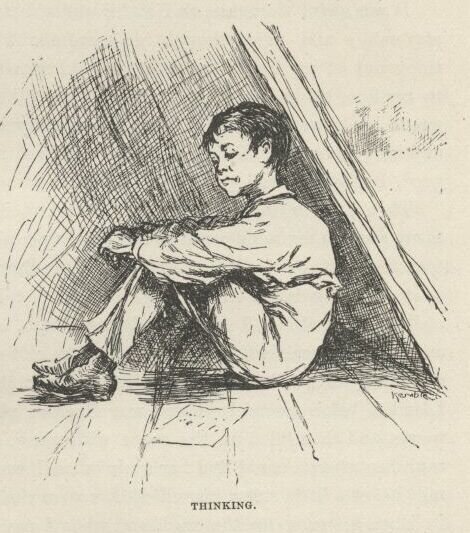
I felt good and all washed clean of sin for the first time I had ever felt so in my life, and I knowed I could pray now. But I didn't do it straight off, but laid the paper down and set there thinking—thinking how good it was all this happened so, and how near I come to being lost and going to hell. And went on thinking. And got to thinking over our trip down the river; and I see Jim before me all the time: in the day and in the night-time, sometimes moonlight, sometimes storms, and we a-floating along, talking and singing and laughing. But somehow I couldn't seem to strike no places to harden me against him, but only the other kind. I'd see him standing my watch on top of his'n, 'stead of calling me, so I could go on sleeping; and see him how glad he was when I come back out of the fog; and when I come to him again in the swamp, up there where the feud was; and such-like times; and would always call me honey, and pet me and do everything he could think of for me, and how good he always was; and at last I struck the time I saved him by telling the men we had small-pox aboard, and he was so grateful, and said I was the best friend old Jim ever had in the world, and the ONLY one he's got now; and then I happened to look around and see that paper.
It was a close place. I took it up, and held it in my hand. I was a-trembling, because I'd got to decide, forever, betwixt two things, and I knowed it. I studied a minute, sort of holding my breath, and then says to myself:
"All right, then, I'll GO to hell"—and tore it up.
It was awful thoughts and awful words, but they was said. And I let them stay said; and never thought no more about reforming. I shoved the whole thing out of my head, and said I would take up wickedness again, which was in my line, being brung up to it, and the other warn't. And for a starter I would go to work and steal Jim out of slavery again; and if I could think up anything worse, I would do that, too; because as long as I was in, and in for good, I might as well go the whole hog.
Then I set to thinking over how to get at it, and turned over some considerable many ways in my mind; and at last fixed up a plan that suited me. So then I took the bearings of a woody island that was down the river a piece, and as soon as it was fairly dark I crept out with my raft and went for it, and hid it there, and then turned in. I slept the night through, and got up before it was light, and had my breakfast, and put on my store clothes, and tied up some others and one thing or another in a bundle, and took the canoe and cleared for shore. I landed below where I judged was Phelps's place, and hid my bundle in the woods, and then filled up the canoe with water, and loaded rocks into her and sunk her where I could find her again when I wanted her, about a quarter of a mile below a little steam sawmill that was on the bank.
Then I struck up the road, and when I passed the mill I see a sign on it, "Phelps's Sawmill," and when I come to the farm-houses, two or three hundred yards further along, I kept my eyes peeled, but didn't see nobody around, though it was good daylight now. But I didn't mind, because I didn't want to see nobody just yet—I only wanted to get the lay of the land. According to my plan, I was going to turn up there from the village, not from below. So I just took a look, and shoved along, straight for town. Well, the very first man I see when I got there was the duke. He was sticking up a bill for the Royal Nonesuch—three-night performance—like that other time. They had the cheek, them frauds! I was right on him before I could shirk. He looked astonished, and says:
"Hel-LO! Where'd YOU come from?" Then he says, kind of glad and eager, "Where's the raft?—got her in a good place?"
I says:
"Why, that's just what I was going to ask your grace."
Then he didn't look so joyful, and says:
"What was your idea for asking ME?" he says.
"Well," I says, "when I see the king in that doggery yesterday I says to myself, we can't get him home for hours, till he's soberer; so I went a-loafing around town to put in the time and wait. A man up and offered me ten cents to help him pull a skiff over the river and back to fetch a sheep, and so I went along; but when we was dragging him to the boat, and the man left me a-holt of the rope and went behind him to shove him along, he was too strong for me and jerked loose and run, and we after him. We didn't have no dog, and so we had to chase him all over the country till we tired him out. We never got him till dark; then we fetched him over, and I started down for the raft. When I got there and see it was gone, I says to myself, 'They've got into trouble and had to leave; and they've took my nigger, which is the only nigger I've got in the world, and now I'm in a strange country, and ain't got no property no more, nor nothing, and no way to make my living;' so I set down and cried. I slept in the woods all night. But what DID become of the raft, then?—and Jim—poor Jim!"
"Blamed if I know—that is, what's become of the raft. That old fool had made a trade and got forty dollars, and when we found him in the doggery the loafers had matched half-dollars with him and got every cent but what he'd spent for whisky; and when I got him home late last night and found the raft gone, we said, 'That little rascal has stole our raft and shook us, and run off down the river.'"
"I wouldn't shake my NIGGER, would I?—the only nigger I had in the world, and the only property."
"We never thought of that. Fact is, I reckon we'd come to consider him OUR nigger; yes, we did consider him so—goodness knows we had trouble enough for him. So when we see the raft was gone and we flat broke, there warn't anything for it but to try the Royal Nonesuch another shake. And I've pegged along ever since, dry as a powder-horn. Where's that ten cents? Give it here."
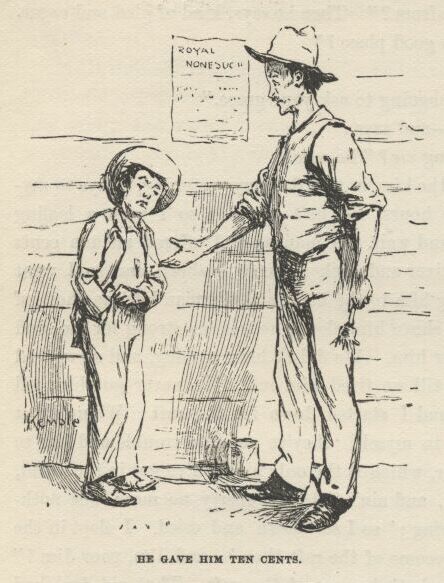
I had considerable money, so I give him ten cents, but begged him to spend it for something to eat, and give me some, because it was all the money I had, and I hadn't had nothing to eat since yesterday. He never said nothing. The next minute he whirls on me and says:
"Do you reckon that nigger would blow on us? We'd skin him if he done that!"
"How can he blow? Hain't he run off?"
"No! That old fool sold him, and never divided with me, and the money's gone."
"SOLD him?" I says, and begun to cry; "why, he was MY nigger, and that was my money. Where is he?—I want my nigger."
"Well, you can't GET your nigger, that's all—so dry up your blubbering. Looky here—do you think YOU'D venture to blow on us? Blamed if I think I'd trust you. Why, if you WAS to blow on us—"
He stopped, but I never see the duke look so ugly out of his eyes before. I went on a-whimpering, and says:
"I don't want to blow on nobody; and I ain't got no time to blow, nohow. I got to turn out and find my nigger."
He looked kinder bothered, and stood there with his bills fluttering on his arm, thinking, and wrinkling up his forehead. At last he says:
"I'll tell you something. We got to be here three days. If you'll promise you won't blow, and won't let the nigger blow, I'll tell you where to find him."
So I promised, and he says:
"A farmer by the name of Silas Ph—" and then he stopped. You see, he started to tell me the truth; but when he stopped that way, and begun to study and think again, I reckoned he was changing his mind. And so he was. He wouldn't trust me; he wanted to make sure of having me out of the way the whole three days. So pretty soon he says:
"The man that bought him is named Abram Foster—Abram G. Foster—and he lives forty mile back here in the country, on the road to Lafayette."
"All right," I says, "I can walk it in three days. And I'll start this very afternoon."
"No you wont, you'll start NOW; and don't you lose any time about it, neither, nor do any gabbling by the way. Just keep a tight tongue in your head and move right along, and then you won't get into trouble with US, d'ye hear?"
That was the order I wanted, and that was the one I played for. I wanted to be left free to work my plans.
"So clear out," he says; "and you can tell Mr. Foster whatever you want to. Maybe you can get him to believe that Jim IS your nigger—some idiots don't require documents—leastways I've heard there's such down South here. And when you tell him the handbill and the reward's bogus, maybe he'll believe you when you explain to him what the idea was for getting 'em out. Go 'long now, and tell him anything you want to; but mind you don't work your jaw any BETWEEN here and there."
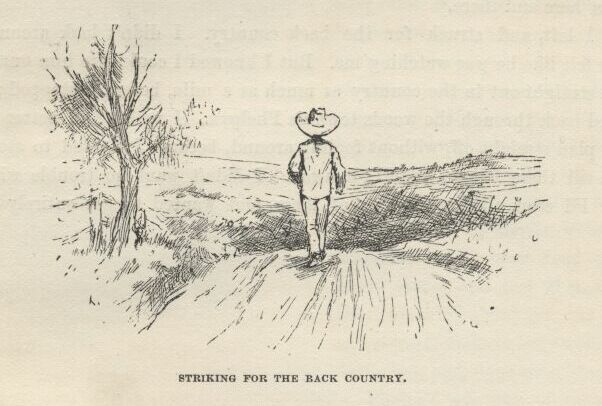
So I left, and struck for the back country. I didn't look around, but I kinder felt like he was watching me. But I knowed I could tire him out at that. I went straight out in the country as much as a mile before I stopped; then I doubled back through the woods towards Phelps'. I reckoned I better start in on my plan straight off without fooling around, because I wanted to stop Jim's mouth till these fellows could get away. I didn't want no trouble with their kind. I'd seen all I wanted to of them, and wanted to get entirely shut of them.
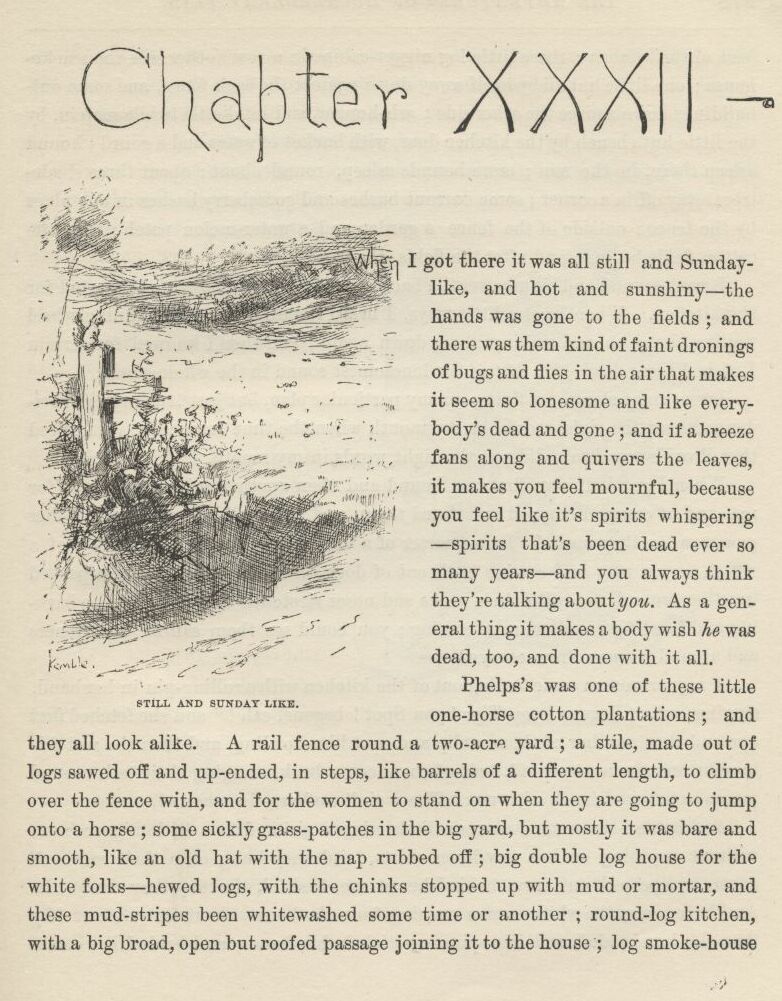
CHAPTER XXXII.
WHEN I got there it was all still and Sunday-like, and hot and sunshiny; the hands was gone to the fields; and there was them kind of faint dronings of bugs and flies in the air that makes it seem so lonesome and like everybody's dead and gone; and if a breeze fans along and quivers the leaves it makes you feel mournful, because you feel like it's spirits whispering—spirits that's been dead ever so many years—and you always think they're talking about YOU. As a general thing it makes a body wish HE was dead, too, and done with it all.
Phelps' was one of these little one-horse cotton plantations, and they all look alike. A rail fence round a two-acre yard; a stile made out of logs sawed off and up-ended in steps, like barrels of a different length, to climb over the fence with, and for the women to stand on when they are going to jump on to a horse; some sickly grass-patches in the big yard, but mostly it was bare and smooth, like an old hat with the nap rubbed off; big double log-house for the white folks—hewed logs, with the chinks stopped up with mud or mortar, and these mud-stripes been whitewashed some time or another; round-log kitchen, with a big broad, open but roofed passage joining it to the house; log smoke-house back of the kitchen; three little log nigger-cabins in a row t'other side the smoke-house; one little hut all by itself away down against the back fence, and some outbuildings down a piece the other side; ash-hopper and big kettle to bile soap in by the little hut; bench by the kitchen door, with bucket of water and a gourd; hound asleep there in the sun; more hounds asleep round about; about three shade trees away off in a corner; some currant bushes and gooseberry bushes in one place by the fence; outside of the fence a garden and a watermelon patch; then the cotton fields begins, and after the fields the woods.
I went around and clumb over the back stile by the ash-hopper, and started for the kitchen. When I got a little ways I heard the dim hum of a spinning-wheel wailing along up and sinking along down again; and then I knowed for certain I wished I was dead—for that IS the lonesomest sound in the whole world.
I went right along, not fixing up any particular plan, but just trusting to Providence to put the right words in my mouth when the time come; for I'd noticed that Providence always did put the right words in my mouth if I left it alone.
When I got half-way, first one hound and then another got up and went for me, and of course I stopped and faced them, and kept still. And such another powwow as they made! In a quarter of a minute I was a kind of a hub of a wheel, as you may say—spokes made out of dogs—circle of fifteen of them packed together around me, with their necks and noses stretched up towards me, a-barking and howling; and more a-coming; you could see them sailing over fences and around corners from everywheres.
A nigger woman come tearing out of the kitchen with a rolling-pin in her hand, singing out, "Begone YOU Tige! you Spot! begone sah!" and she fetched first one and then another of them a clip and sent them howling, and then the rest followed; and the next second half of them come back, wagging their tails around me, and making friends with me. There ain't no harm in a hound, nohow.
And behind the woman comes a little nigger girl and two little nigger boys without anything on but tow-linen shirts, and they hung on to their mother's gown, and peeped out from behind her at me, bashful, the way they always do. And here comes the white woman running from the house, about forty-five or fifty year old, bareheaded, and her spinning-stick in her hand; and behind her comes her little white children, acting the same way the little niggers was going. She was smiling all over so she could hardly stand—and says:
"It's YOU, at last!—AIN'T it?"
I out with a "Yes'm" before I thought.
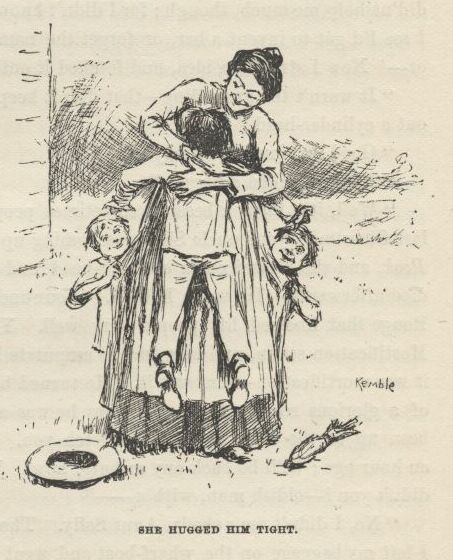
She grabbed me and hugged me tight; and then gripped me by both hands and shook and shook; and the tears come in her eyes, and run down over; and she couldn't seem to hug and shake enough, and kept saying, "You don't look as much like your mother as I reckoned you would; but law sakes, I don't care for that, I'm so glad to see you! Dear, dear, it does seem like I could eat you up! Children, it's your cousin Tom!—tell him howdy."
But they ducked their heads, and put their fingers in their mouths, and hid behind her. So she run on:
"Lize, hurry up and get him a hot breakfast right away—or did you get your breakfast on the boat?"
I said I had got it on the boat. So then she started for the house, leading me by the hand, and the children tagging after. When we got there she set me down in a split-bottomed chair, and set herself down on a little low stool in front of me, holding both of my hands, and says:
"Now I can have a GOOD look at you; and, laws-a-me, I've been hungry for it a many and a many a time, all these long years, and it's come at last! We been expecting you a couple of days and more. What kep' you?—boat get aground?"
"Yes'm—she—"
"Don't say yes'm—say Aunt Sally. Where'd she get aground?"
I didn't rightly know what to say, because I didn't know whether the boat would be coming up the river or down. But I go a good deal on instinct; and my instinct said she would be coming up—from down towards Orleans. That didn't help me much, though; for I didn't know the names of bars down that way. I see I'd got to invent a bar, or forget the name of the one we got aground on—or—Now I struck an idea, and fetched it out:
"It warn't the grounding—that didn't keep us back but a little. We blowed out a cylinder-head."
"Good gracious! anybody hurt?"
"No'm. Killed a nigger."
"Well, it's lucky; because sometimes people do get hurt. Two years ago last Christmas your uncle Silas was coming up from Newrleans on the old Lally Rook, and she blowed out a cylinder-head and crippled a man. And I think he died afterwards. He was a Baptist. Your uncle Silas knowed a family in Baton Rouge that knowed his people very well. Yes, I remember now, he DID die. Mortification set in, and they had to amputate him. But it didn't save him. Yes, it was mortification—that was it. He turned blue all over, and died in the hope of a glorious resurrection. They say he was a sight to look at. Your uncle's been up to the town every day to fetch you. And he's gone again, not more'n an hour ago; he'll be back any minute now. You must a met him on the road, didn't you?—oldish man, with a—"
"No, I didn't see nobody, Aunt Sally. The boat landed just at daylight, and I left my baggage on the wharf-boat and went looking around the town and out a piece in the country, to put in the time and not get here too soon; and so I come down the back way."
"Who'd you give the baggage to?"
"Nobody."
"Why, child, it 'll be stole!"
"Not where I hid it I reckon it won't," I says.
"How'd you get your breakfast so early on the boat?"
It was kinder thin ice, but I says:
"The captain see me standing around, and told me I better have something to eat before I went ashore; so he took me in the texas to the officers' lunch, and give me all I wanted."
I was getting so uneasy I couldn't listen good. I had my mind on the children all the time; I wanted to get them out to one side and pump them a little, and find out who I was. But I couldn't get no show, Mrs. Phelps kept it up and run on so. Pretty soon she made the cold chills streak all down my back, because she says:
"But here we're a-running on this way, and you hain't told me a word about Sis, nor any of them. Now I'll rest my works a little, and you start up yourn; just tell me EVERYTHING—tell me all about 'm all every one of 'm; and how they are, and what they're doing, and what they told you to tell me; and every last thing you can think of."
Well, I see I was up a stump—and up it good. Providence had stood by me this fur all right, but I was hard and tight aground now. I see it warn't a bit of use to try to go ahead—I'd got to throw up my hand. So I says to myself, here's another place where I got to resk the truth. I opened my mouth to begin; but she grabbed me and hustled me in behind the bed, and says:
"Here he comes! Stick your head down lower—there, that'll do; you can't be seen now. Don't you let on you're here. I'll play a joke on him. Children, don't you say a word."
I see I was in a fix now. But it warn't no use to worry; there warn't nothing to do but just hold still, and try and be ready to stand from under when the lightning struck.
I had just one little glimpse of the old gentleman when he come in; then the bed hid him. Mrs. Phelps she jumps for him, and says:
"Has he come?"
"No," says her husband.
"Good-NESS gracious!" she says, "what in the warld can have become of him?"
"I can't imagine," says the old gentleman; "and I must say it makes me dreadful uneasy."
"Uneasy!" she says; "I'm ready to go distracted! He MUST a come; and you've missed him along the road. I KNOW it's so—something tells me so."
"Why, Sally, I COULDN'T miss him along the road—YOU know that."
"But oh, dear, dear, what WILL Sis say! He must a come! You must a missed him. He—"
"Oh, don't distress me any more'n I'm already distressed. I don't know what in the world to make of it. I'm at my wit's end, and I don't mind acknowledging 't I'm right down scared. But there's no hope that he's come; for he COULDN'T come and me miss him. Sally, it's terrible—just terrible—something's happened to the boat, sure!"
"Why, Silas! Look yonder!—up the road!—ain't that somebody coming?"
He sprung to the window at the head of the bed, and that give Mrs. Phelps the chance she wanted. She stooped down quick at the foot of the bed and give me a pull, and out I come; and when he turned back from the window there she stood, a-beaming and a-smiling like a house afire, and I standing pretty meek and sweaty alongside. The old gentleman stared, and says:
"Why, who's that?"
"Who do you reckon 't is?"
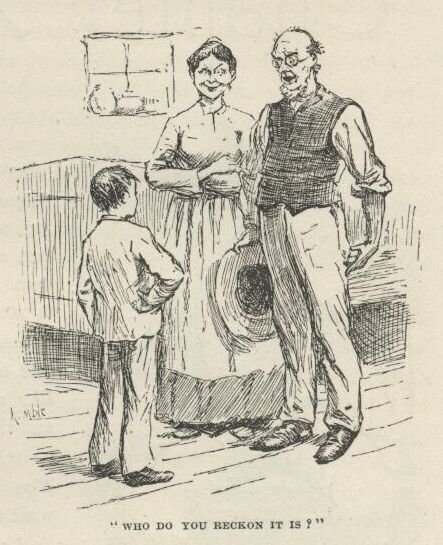
"I hain't no idea. Who IS it?"
"It's TOM SAWYER!"
By jings, I most slumped through the floor! But there warn't no time to swap knives; the old man grabbed me by the hand and shook, and kept on shaking; and all the time how the woman did dance around and laugh and cry; and then how they both did fire off questions about Sid, and Mary, and the rest of the tribe.
But if they was joyful, it warn't nothing to what I was; for it was like being born again, I was so glad to find out who I was. Well, they froze to me for two hours; and at last, when my chin was so tired it couldn't hardly go any more, I had told them more about my family—I mean the Sawyer family—than ever happened to any six Sawyer families. And I explained all about how we blowed out a cylinder-head at the mouth of White River, and it took us three days to fix it. Which was all right, and worked first-rate; because THEY didn't know but what it would take three days to fix it. If I'd a called it a bolthead it would a done just as well.
Now I was feeling pretty comfortable all down one side, and pretty uncomfortable all up the other. Being Tom Sawyer was easy and comfortable, and it stayed easy and comfortable till by and by I hear a steamboat coughing along down the river. Then I says to myself, s'pose Tom Sawyer comes down on that boat? And s'pose he steps in here any minute, and sings out my name before I can throw him a wink to keep quiet?
Well, I couldn't HAVE it that way; it wouldn't do at all. I must go up the road and waylay him. So I told the folks I reckoned I would go up to the town and fetch down my baggage. The old gentleman was for going along with me, but I said no, I could drive the horse myself, and I druther he wouldn't take no trouble about me.
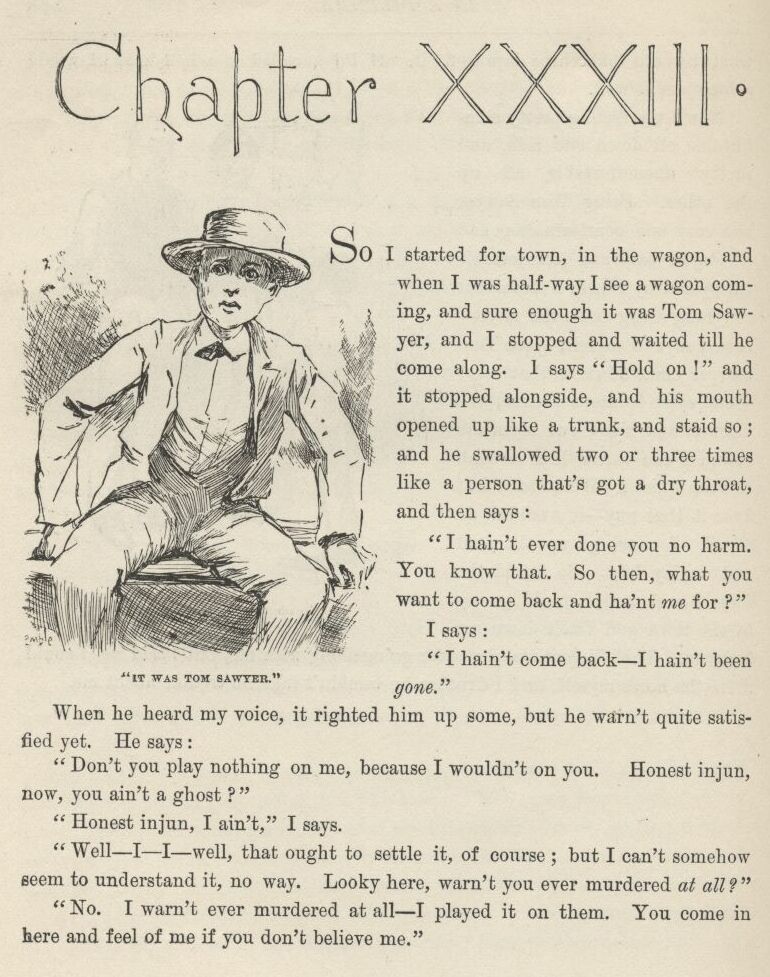
CHAPTER XXXIII.
SO I started for town in the wagon, and when I was half-way I see a wagon coming, and sure enough it was Tom Sawyer, and I stopped and waited till he come along. I says "Hold on!" and it stopped alongside, and his mouth opened up like a trunk, and stayed so; and he swallowed two or three times like a person that's got a dry throat, and then says:
"I hain't ever done you no harm. You know that. So, then, what you want to come back and ha'nt ME for?"
I says:
"I hain't come back—I hain't been GONE."
When he heard my voice it righted him up some, but he warn't quite satisfied yet. He says:
"Don't you play nothing on me, because I wouldn't on you. Honest injun, you ain't a ghost?"
"Honest injun, I ain't," I says.
"Well—I—I—well, that ought to settle it, of course; but I can't somehow seem to understand it no way. Looky here, warn't you ever murdered AT ALL?"
"No. I warn't ever murdered at all—I played it on them. You come in here and feel of me if you don't believe me."
So he done it; and it satisfied him; and he was that glad to see me again he didn't know what to do. And he wanted to know all about it right off, because it was a grand adventure, and mysterious, and so it hit him where he lived. But I said, leave it alone till by and by; and told his driver to wait, and we drove off a little piece, and I told him the kind of a fix I was in, and what did he reckon we better do? He said, let him alone a minute, and don't disturb him. So he thought and thought, and pretty soon he says:
"It's all right; I've got it. Take my trunk in your wagon, and let on it's your'n; and you turn back and fool along slow, so as to get to the house about the time you ought to; and I'll go towards town a piece, and take a fresh start, and get there a quarter or a half an hour after you; and you needn't let on to know me at first."
I says:
"All right; but wait a minute. There's one more thing—a thing that NOBODY don't know but me. And that is, there's a nigger here that I'm a-trying to steal out of slavery, and his name is JIM—old Miss Watson's Jim."
He says:
"What! Why, Jim is—"
He stopped and went to studying. I says:
"I know what you'll say. You'll say it's dirty, low-down business; but what if it is? I'm low down; and I'm a-going to steal him, and I want you keep mum and not let on. Will you?"
His eye lit up, and he says:
"I'll HELP you steal him!"
Well, I let go all holts then, like I was shot. It was the most astonishing speech I ever heard—and I'm bound to say Tom Sawyer fell considerable in my estimation. Only I couldn't believe it. Tom Sawyer a NIGGER-STEALER!
"Oh, shucks!" I says; "you're joking."
"I ain't joking, either."
"Well, then," I says, "joking or no joking, if you hear anything said about a runaway nigger, don't forget to remember that YOU don't know nothing about him, and I don't know nothing about him."
Then we took the trunk and put it in my wagon, and he drove off his way and I drove mine. But of course I forgot all about driving slow on accounts of being glad and full of thinking; so I got home a heap too quick for that length of a trip. The old gentleman was at the door, and he says:
"Why, this is wonderful! Whoever would a thought it was in that mare to do it? I wish we'd a timed her. And she hain't sweated a hair—not a hair. It's wonderful. Why, I wouldn't take a hundred dollars for that horse now—I wouldn't, honest; and yet I'd a sold her for fifteen before, and thought 'twas all she was worth."
That's all he said. He was the innocentest, best old soul I ever see. But it warn't surprising; because he warn't only just a farmer, he was a preacher, too, and had a little one-horse log church down back of the plantation, which he built it himself at his own expense, for a church and schoolhouse, and never charged nothing for his preaching, and it was worth it, too. There was plenty other farmer-preachers like that, and done the same way, down South.
In about half an hour Tom's wagon drove up to the front stile, and Aunt Sally she see it through the window, because it was only about fifty yards, and says:
"Why, there's somebody come! I wonder who 'tis? Why, I do believe it's a stranger. Jimmy" (that's one of the children) "run and tell Lize to put on another plate for dinner."
Everybody made a rush for the front door, because, of course, a stranger don't come EVERY year, and so he lays over the yaller-fever, for interest, when he does come. Tom was over the stile and starting for the house; the wagon was spinning up the road for the village, and we was all bunched in the front door. Tom had his store clothes on, and an audience—and that was always nuts for Tom Sawyer. In them circumstances it warn't no trouble to him to throw in an amount of style that was suitable. He warn't a boy to meeky along up that yard like a sheep; no, he come ca'm and important, like the ram. When he got a-front of us he lifts his hat ever so gracious and dainty, like it was the lid of a box that had butterflies asleep in it and he didn't want to disturb them, and says:
"Mr. Archibald Nichols, I presume?"
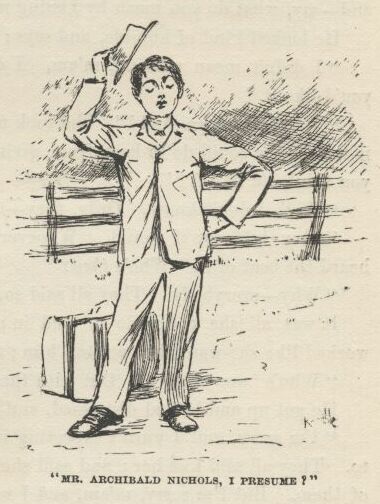
"No, my boy," says the old gentleman, "I'm sorry to say 't your driver has deceived you; Nichols's place is down a matter of three mile more. Come in, come in."
Tom he took a look back over his shoulder, and says, "Too late—he's out of sight."
"Yes, he's gone, my son, and you must come in and eat your dinner with us; and then we'll hitch up and take you down to Nichols's."
"Oh, I CAN'T make you so much trouble; I couldn't think of it. I'll walk—I don't mind the distance."
"But we won't LET you walk—it wouldn't be Southern hospitality to do it. Come right in."
"Oh, DO," says Aunt Sally; "it ain't a bit of trouble to us, not a bit in the world. You must stay. It's a long, dusty three mile, and we can't let you walk. And, besides, I've already told 'em to put on another plate when I see you coming; so you mustn't disappoint us. Come right in and make yourself at home."
So Tom he thanked them very hearty and handsome, and let himself be persuaded, and come in; and when he was in he said he was a stranger from Hicksville, Ohio, and his name was William Thompson—and he made another bow.
Well, he run on, and on, and on, making up stuff about Hicksville and everybody in it he could invent, and I getting a little nervious, and wondering how this was going to help me out of my scrape; and at last, still talking along, he reached over and kissed Aunt Sally right on the mouth, and then settled back again in his chair comfortable, and was going on talking; but she jumped up and wiped it off with the back of her hand, and says:
"You owdacious puppy!"
He looked kind of hurt, and says:
"I'm surprised at you, m'am."
"You're s'rp—Why, what do you reckon I am? I've a good notion to take and—Say, what do you mean by kissing me?"
He looked kind of humble, and says:
"I didn't mean nothing, m'am. I didn't mean no harm. I—I—thought you'd like it."
"Why, you born fool!" She took up the spinning stick, and it looked like it was all she could do to keep from giving him a crack with it. "What made you think I'd like it?"
"Well, I don't know. Only, they—they—told me you would."
"THEY told you I would. Whoever told you's ANOTHER lunatic. I never heard the beat of it. Who's THEY?"
"Why, everybody. They all said so, m'am."
It was all she could do to hold in; and her eyes snapped, and her fingers worked like she wanted to scratch him; and she says:
"Who's 'everybody'? Out with their names, or ther'll be an idiot short."
He got up and looked distressed, and fumbled his hat, and says:
"I'm sorry, and I warn't expecting it. They told me to. They all told me to. They all said, kiss her; and said she'd like it. They all said it—every one of them. But I'm sorry, m'am, and I won't do it no more—I won't, honest."
"You won't, won't you? Well, I sh'd RECKON you won't!"
"No'm, I'm honest about it; I won't ever do it again—till you ask me."
"Till I ASK you! Well, I never see the beat of it in my born days! I lay you'll be the Methusalem-numskull of creation before ever I ask you—or the likes of you."
"Well," he says, "it does surprise me so. I can't make it out, somehow. They said you would, and I thought you would. But—" He stopped and looked around slow, like he wished he could run across a friendly eye somewheres, and fetched up on the old gentleman's, and says, "Didn't YOU think she'd like me to kiss her, sir?"
"Why, no; I—I—well, no, I b'lieve I didn't."
Then he looks on around the same way to me, and says:
"Tom, didn't YOU think Aunt Sally 'd open out her arms and say, 'Sid Sawyer—'"
"My land!" she says, breaking in and jumping for him, "you impudent young rascal, to fool a body so—" and was going to hug him, but he fended her off, and says:
"No, not till you've asked me first."
So she didn't lose no time, but asked him; and hugged him and kissed him over and over again, and then turned him over to the old man, and he took what was left. And after they got a little quiet again she says:
"Why, dear me, I never see such a surprise. We warn't looking for YOU at all, but only Tom. Sis never wrote to me about anybody coming but him."
"It's because it warn't INTENDED for any of us to come but Tom," he says; "but I begged and begged, and at the last minute she let me come, too; so, coming down the river, me and Tom thought it would be a first-rate surprise for him to come here to the house first, and for me to by and by tag along and drop in, and let on to be a stranger. But it was a mistake, Aunt Sally. This ain't no healthy place for a stranger to come."
"No—not impudent whelps, Sid. You ought to had your jaws boxed; I hain't been so put out since I don't know when. But I don't care, I don't mind the terms—I'd be willing to stand a thousand such jokes to have you here. Well, to think of that performance! I don't deny it, I was most putrified with astonishment when you give me that smack."
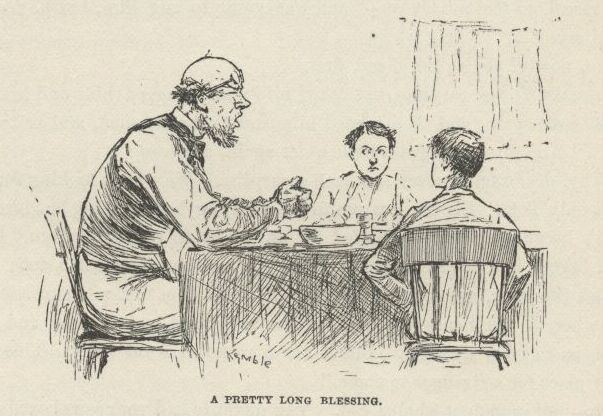
We had dinner out in that broad open passage betwixt the house and the kitchen; and there was things enough on that table for seven families—and all hot, too; none of your flabby, tough meat that's laid in a cupboard in a damp cellar all night and tastes like a hunk of old cold cannibal in the morning. Uncle Silas he asked a pretty long blessing over it, but it was worth it; and it didn't cool it a bit, neither, the way I've seen them kind of interruptions do lots of times. There was a considerable good deal of talk all the afternoon, and me and Tom was on the lookout all the time; but it warn't no use, they didn't happen to say nothing about any runaway nigger, and we was afraid to try to work up to it. But at supper, at night, one of the little boys says:
"Pa, mayn't Tom and Sid and me go to the show?"
"No," says the old man, "I reckon there ain't going to be any; and you couldn't go if there was; because the runaway nigger told Burton and me all about that scandalous show, and Burton said he would tell the people; so I reckon they've drove the owdacious loafers out of town before this time."
So there it was!—but I couldn't help it. Tom and me was to sleep in the same room and bed; so, being tired, we bid good-night and went up to bed right after supper, and clumb out of the window and down the lightning-rod, and shoved for the town; for I didn't believe anybody was going to give the king and the duke a hint, and so if I didn't hurry up and give them one they'd get into trouble sure.
On the road Tom he told me all about how it was reckoned I was murdered, and how pap disappeared pretty soon, and didn't come back no more, and what a stir there was when Jim run away; and I told Tom all about our Royal Nonesuch rapscallions, and as much of the raft voyage as I had time to; and as we struck into the town and up through the—here comes a raging rush of people with torches, and an awful whooping and yelling, and banging tin pans and blowing horns; and we jumped to one side to let them go by; and as they went by I see they had the king and the duke astraddle of a rail—that is, I knowed it WAS the king and the duke, though they was all over tar and feathers, and didn't look like nothing in the world that was human—just looked like a couple of monstrous big soldier-plumes. Well, it made me sick to see it; and I was sorry for them poor pitiful rascals, it seemed like I couldn't ever feel any hardness against them any more in the world. It was a dreadful thing to see. Human beings CAN be awful cruel to one another.
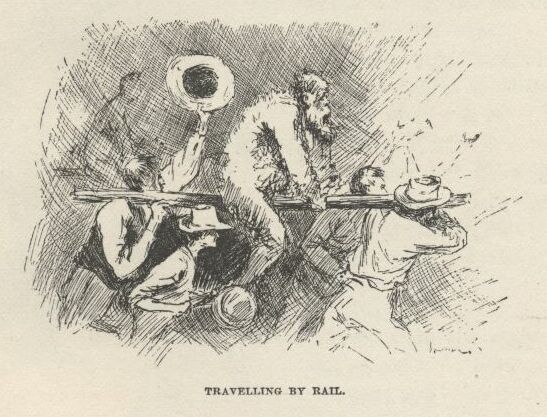
We see we was too late—couldn't do no good. We asked some stragglers about it, and they said everybody went to the show looking very innocent; and laid low and kept dark till the poor old king was in the middle of his cavortings on the stage; then somebody give a signal, and the house rose up and went for them.
So we poked along back home, and I warn't feeling so brash as I was before, but kind of ornery, and humble, and to blame, somehow—though I hadn't done nothing. But that's always the way; it don't make no difference whether you do right or wrong, a person's conscience ain't got no sense, and just goes for him anyway. If I had a yaller dog that didn't know no more than a person's conscience does I would pison him. It takes up more room than all the rest of a person's insides, and yet ain't no good, nohow. Tom Sawyer he says the same.
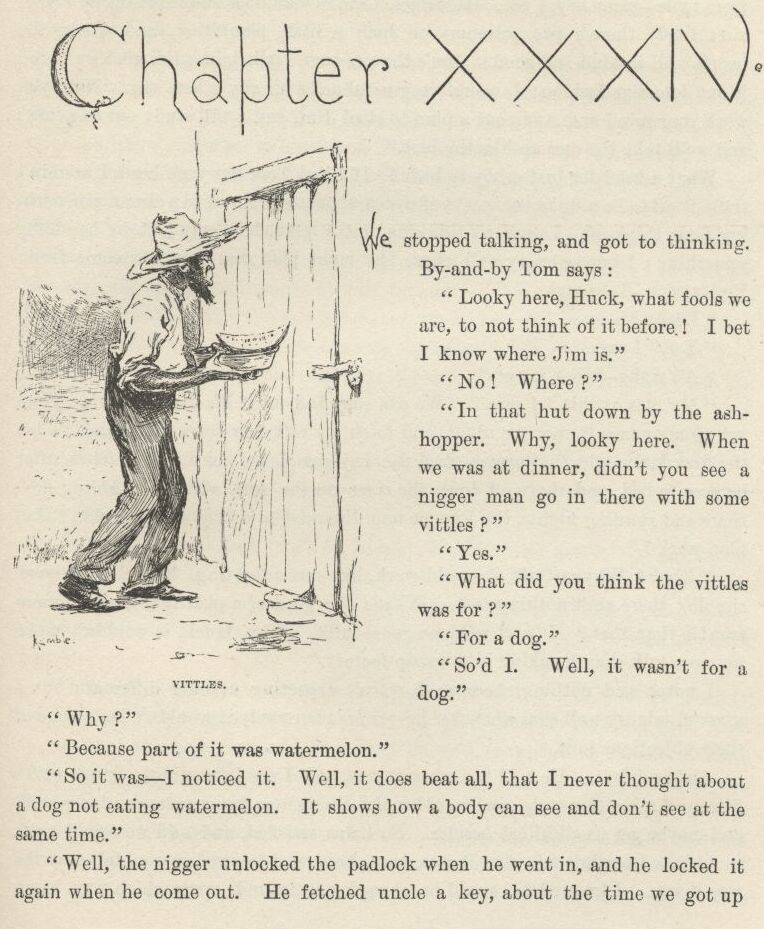
CHAPTER XXXIV.
WE stopped talking, and got to thinking. By and by Tom says:
"Looky here, Huck, what fools we are to not think of it before! I bet I know where Jim is."
"No! Where?"
"In that hut down by the ash-hopper. Why, looky here. When we was at dinner, didn't you see a nigger man go in there with some vittles?"
"Yes."
"What did you think the vittles was for?"
"For a dog."
"So 'd I. Well, it wasn't for a dog."
"Why?"
"Because part of it was watermelon."
"So it was—I noticed it. Well, it does beat all that I never thought about a dog not eating watermelon. It shows how a body can see and don't see at the same time."
"Well, the nigger unlocked the padlock when he went in, and he locked it again when he came out. He fetched uncle a key about the time we got up from table—same key, I bet. Watermelon shows man, lock shows prisoner; and it ain't likely there's two prisoners on such a little plantation, and where the people's all so kind and good. Jim's the prisoner. All right—I'm glad we found it out detective fashion; I wouldn't give shucks for any other way. Now you work your mind, and study out a plan to steal Jim, and I will study out one, too; and we'll take the one we like the best."
What a head for just a boy to have! If I had Tom Sawyer's head I wouldn't trade it off to be a duke, nor mate of a steamboat, nor clown in a circus, nor nothing I can think of. I went to thinking out a plan, but only just to be doing something; I knowed very well where the right plan was going to come from. Pretty soon Tom says:
"Ready?"
"Yes," I says.
"All right—bring it out."
"My plan is this," I says. "We can easy find out if it's Jim in there. Then get up my canoe to-morrow night, and fetch my raft over from the island. Then the first dark night that comes steal the key out of the old man's britches after he goes to bed, and shove off down the river on the raft with Jim, hiding daytimes and running nights, the way me and Jim used to do before. Wouldn't that plan work?"
"WORK? Why, cert'nly it would work, like rats a-fighting. But it's too blame' simple; there ain't nothing TO it. What's the good of a plan that ain't no more trouble than that? It's as mild as goose-milk. Why, Huck, it wouldn't make no more talk than breaking into a soap factory."
I never said nothing, because I warn't expecting nothing different; but I knowed mighty well that whenever he got HIS plan ready it wouldn't have none of them objections to it.
And it didn't. He told me what it was, and I see in a minute it was worth fifteen of mine for style, and would make Jim just as free a man as mine would, and maybe get us all killed besides. So I was satisfied, and said we would waltz in on it. I needn't tell what it was here, because I knowed it wouldn't stay the way, it was. I knowed he would be changing it around every which way as we went along, and heaving in new bullinesses wherever he got a chance. And that is what he done.
Well, one thing was dead sure, and that was that Tom Sawyer was in earnest, and was actuly going to help steal that nigger out of slavery. That was the thing that was too many for me. Here was a boy that was respectable and well brung up; and had a character to lose; and folks at home that had characters; and he was bright and not leather-headed; and knowing and not ignorant; and not mean, but kind; and yet here he was, without any more pride, or rightness, or feeling, than to stoop to this business, and make himself a shame, and his family a shame, before everybody. I COULDN'T understand it no way at all. It was outrageous, and I knowed I ought to just up and tell him so; and so be his true friend, and let him quit the thing right where he was and save himself. And I DID start to tell him; but he shut me up, and says:
"Don't you reckon I know what I'm about? Don't I generly know what I'm about?"
"Yes."
"Didn't I SAY I was going to help steal the nigger?"
"Yes."
"WELL, then."
That's all he said, and that's all I said. It warn't no use to say any more; because when he said he'd do a thing, he always done it. But I couldn't make out how he was willing to go into this thing; so I just let it go, and never bothered no more about it. If he was bound to have it so, I couldn't help it.
When we got home the house was all dark and still; so we went on down to the hut by the ash-hopper for to examine it. We went through the yard so as to see what the hounds would do. They knowed us, and didn't make no more noise than country dogs is always doing when anything comes by in the night. When we got to the cabin we took a look at the front and the two sides; and on the side I warn't acquainted with—which was the north side—we found a square window-hole, up tolerable high, with just one stout board nailed across it. I says:
"Here's the ticket. This hole's big enough for Jim to get through if we wrench off the board."
Tom says:
"It's as simple as tit-tat-toe, three-in-a-row, and as easy as playing hooky. I should HOPE we can find a way that's a little more complicated than THAT, Huck Finn."
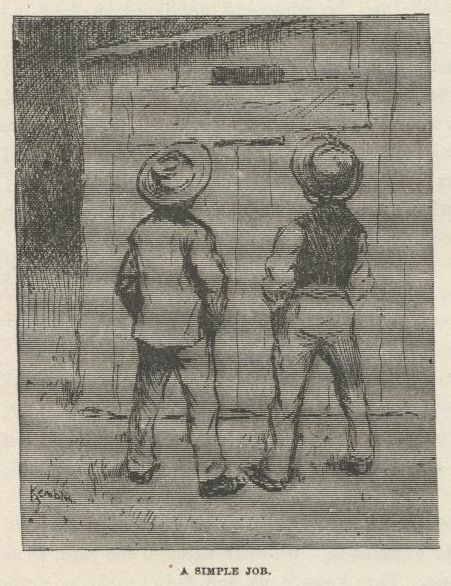
"Well, then," I says, "how 'll it do to saw him out, the way I done before I was murdered that time?"
"That's more LIKE," he says. "It's real mysterious, and troublesome, and good," he says; "but I bet we can find a way that's twice as long. There ain't no hurry; le's keep on looking around."
Betwixt the hut and the fence, on the back side, was a lean-to that joined the hut at the eaves, and was made out of plank. It was as long as the hut, but narrow—only about six foot wide. The door to it was at the south end, and was padlocked. Tom he went to the soap-kettle and searched around, and fetched back the iron thing they lift the lid with; so he took it and prized out one of the staples. The chain fell down, and we opened the door and went in, and shut it, and struck a match, and see the shed was only built against a cabin and hadn't no connection with it; and there warn't no floor to the shed, nor nothing in it but some old rusty played-out hoes and spades and picks and a crippled plow. The match went out, and so did we, and shoved in the staple again, and the door was locked as good as ever. Tom was joyful. He says;
"Now we're all right. We'll DIG him out. It 'll take about a week!"
Then we started for the house, and I went in the back door—you only have to pull a buckskin latch-string, they don't fasten the doors—but that warn't romantical enough for Tom Sawyer; no way would do him but he must climb up the lightning-rod. But after he got up half way about three times, and missed fire and fell every time, and the last time most busted his brains out, he thought he'd got to give it up; but after he was rested he allowed he would give her one more turn for luck, and this time he made the trip.
In the morning we was up at break of day, and down to the nigger cabins to pet the dogs and make friends with the nigger that fed Jim—if it WAS Jim that was being fed. The niggers was just getting through breakfast and starting for the fields; and Jim's nigger was piling up a tin pan with bread and meat and things; and whilst the others was leaving, the key come from the house.
This nigger had a good-natured, chuckle-headed face, and his wool was all tied up in little bunches with thread. That was to keep witches off. He said the witches was pestering him awful these nights, and making him see all kinds of strange things, and hear all kinds of strange words and noises, and he didn't believe he was ever witched so long before in his life. He got so worked up, and got to running on so about his troubles, he forgot all about what he'd been a-going to do. So Tom says:
"What's the vittles for? Going to feed the dogs?"
The nigger kind of smiled around gradually over his face, like when you heave a brickbat in a mud-puddle, and he says:
"Yes, Mars Sid, A dog. Cur'us dog, too. Does you want to go en look at 'im?"
"Yes."
I hunched Tom, and whispers:
"You going, right here in the daybreak? THAT warn't the plan."
"No, it warn't; but it's the plan NOW."
So, drat him, we went along, but I didn't like it much. When we got in we couldn't hardly see anything, it was so dark; but Jim was there, sure enough, and could see us; and he sings out:
"Why, HUCK! En good LAN'! ain' dat Misto Tom?"
I just knowed how it would be; I just expected it. I didn't know nothing to do; and if I had I couldn't a done it, because that nigger busted in and says:
"Why, de gracious sakes! do he know you genlmen?"
We could see pretty well now. Tom he looked at the nigger, steady and kind of wondering, and says:
"Does WHO know us?"
"Why, dis-yer runaway nigger."
"I don't reckon he does; but what put that into your head?"
"What PUT it dar? Didn' he jis' dis minute sing out like he knowed you?"
Tom says, in a puzzled-up kind of way:
"Well, that's mighty curious. WHO sung out? WHEN did he sing out? WHAT did he sing out?" And turns to me, perfectly ca'm, and says, "Did YOU hear anybody sing out?"
Of course there warn't nothing to be said but the one thing; so I says:
"No; I ain't heard nobody say nothing."
Then he turns to Jim, and looks him over like he never see him before, and says:
"Did you sing out?"
"No, sah," says Jim; "I hain't said nothing, sah."
"Not a word?"
"No, sah, I hain't said a word."
"Did you ever see us before?"
"No, sah; not as I knows on."
So Tom turns to the nigger, which was looking wild and distressed, and says, kind of severe:
"What do you reckon's the matter with you, anyway? What made you think somebody sung out?"
"Oh, it's de dad-blame' witches, sah, en I wisht I was dead, I do. Dey's awluz at it, sah, en dey do mos' kill me, dey sk'yers me so. Please to don't tell nobody 'bout it sah, er ole Mars Silas he'll scole me; 'kase he say dey AIN'T no witches. I jis' wish to goodness he was heah now—DEN what would he say! I jis' bet he couldn' fine no way to git aroun' it DIS time. But it's awluz jis' so; people dat's SOT, stays sot; dey won't look into noth'n'en fine it out f'r deyselves, en when YOU fine it out en tell um 'bout it, dey doan' b'lieve you."
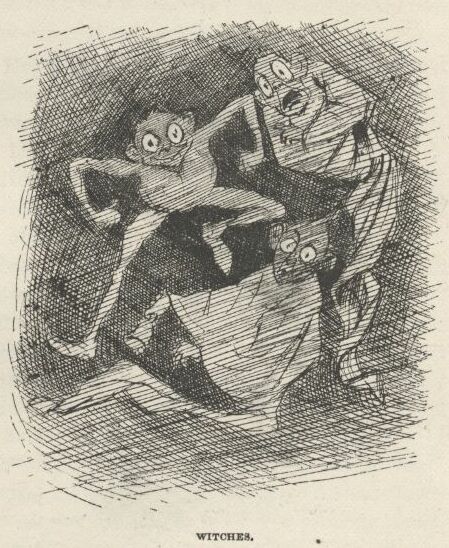
Tom give him a dime, and said we wouldn't tell nobody; and told him to buy some more thread to tie up his wool with; and then looks at Jim, and says:
"I wonder if Uncle Silas is going to hang this nigger. If I was to catch a nigger that was ungrateful enough to run away, I wouldn't give him up, I'd hang him." And whilst the nigger stepped to the door to look at the dime and bite it to see if it was good, he whispers to Jim and says:
"Don't ever let on to know us. And if you hear any digging going on nights, it's us; we're going to set you free."
Jim only had time to grab us by the hand and squeeze it; then the nigger come back, and we said we'd come again some time if the nigger wanted us to; and he said he would, more particular if it was dark, because the witches went for him mostly in the dark, and it was good to have folks around then.
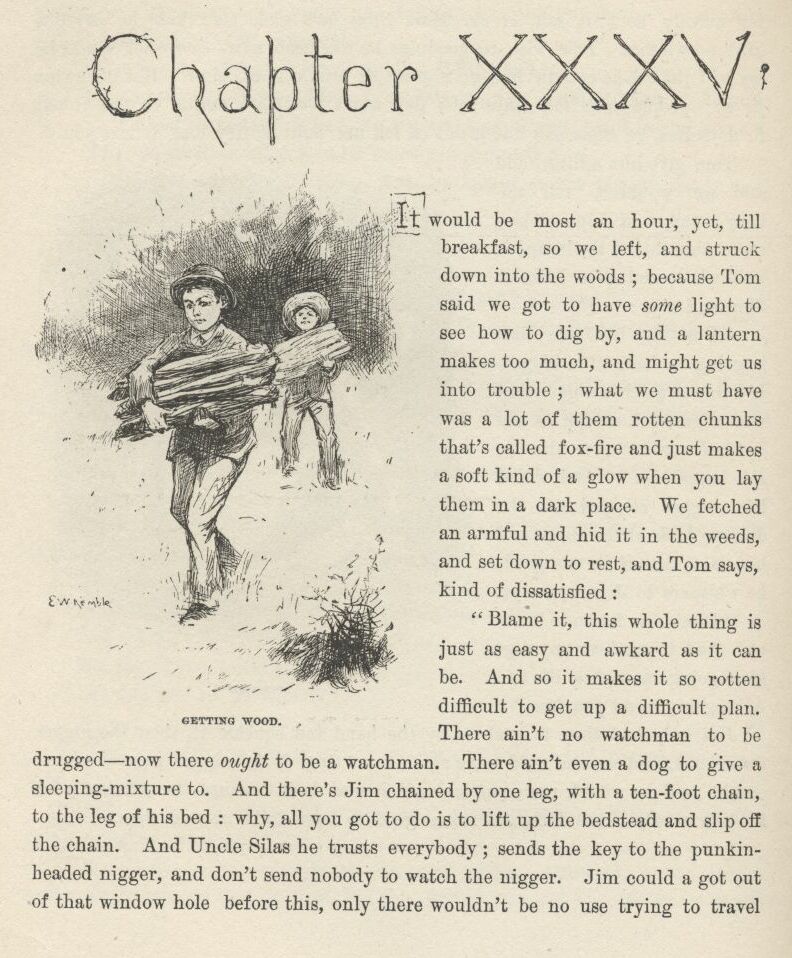
CHAPTER XXXV.
IT would be most an hour yet till breakfast, so we left and struck down into the woods; because Tom said we got to have SOME light to see how to dig by, and a lantern makes too much, and might get us into trouble; what we must have was a lot of them rotten chunks that's called fox-fire, and just makes a soft kind of a glow when you lay them in a dark place. We fetched an armful and hid it in the weeds, and set down to rest, and Tom says, kind of dissatisfied:
"Blame it, this whole thing is just as easy and awkward as it can be. And so it makes it so rotten difficult to get up a difficult plan. There ain't no watchman to be drugged—now there OUGHT to be a watchman. There ain't even a dog to give a sleeping-mixture to. And there's Jim chained by one leg, with a ten-foot chain, to the leg of his bed: why, all you got to do is to lift up the bedstead and slip off the chain. And Uncle Silas he trusts everybody; sends the key to the punkin-headed nigger, and don't send nobody to watch the nigger. Jim could a got out of that window-hole before this, only there wouldn't be no use trying to travel with a ten-foot chain on his leg. Why, drat it, Huck, it's the stupidest arrangement I ever see. You got to invent ALL the difficulties. Well, we can't help it; we got to do the best we can with the materials we've got. Anyhow, there's one thing—there's more honor in getting him out through a lot of difficulties and dangers, where there warn't one of them furnished to you by the people who it was their duty to furnish them, and you had to contrive them all out of your own head. Now look at just that one thing of the lantern. When you come down to the cold facts, we simply got to LET ON that a lantern's resky. Why, we could work with a torchlight procession if we wanted to, I believe. Now, whilst I think of it, we got to hunt up something to make a saw out of the first chance we get."
"What do we want of a saw?"
"What do we WANT of a saw? Hain't we got to saw the leg of Jim's bed off, so as to get the chain loose?"
"Why, you just said a body could lift up the bedstead and slip the chain off."
"Well, if that ain't just like you, Huck Finn. You CAN get up the infant-schooliest ways of going at a thing. Why, hain't you ever read any books at all?—Baron Trenck, nor Casanova, nor Benvenuto Chelleeny, nor Henri IV., nor none of them heroes? Who ever heard of getting a prisoner loose in such an old-maidy way as that? No; the way all the best authorities does is to saw the bed-leg in two, and leave it just so, and swallow the sawdust, so it can't be found, and put some dirt and grease around the sawed place so the very keenest seneskal can't see no sign of it's being sawed, and thinks the bed-leg is perfectly sound. Then, the night you're ready, fetch the leg a kick, down she goes; slip off your chain, and there you are. Nothing to do but hitch your rope ladder to the battlements, shin down it, break your leg in the moat—because a rope ladder is nineteen foot too short, you know—and there's your horses and your trusty vassles, and they scoop you up and fling you across a saddle, and away you go to your native Langudoc, or Navarre, or wherever it is. It's gaudy, Huck. I wish there was a moat to this cabin. If we get time, the night of the escape, we'll dig one."
I says:
"What do we want of a moat when we're going to snake him out from under the cabin?"
But he never heard me. He had forgot me and everything else. He had his chin in his hand, thinking. Pretty soon he sighs and shakes his head; then sighs again, and says:
"No, it wouldn't do—there ain't necessity enough for it."
"For what?" I says.
"Why, to saw Jim's leg off," he says.
"Good land!" I says; "why, there ain't NO necessity for it. And what would you want to saw his leg off for, anyway?"
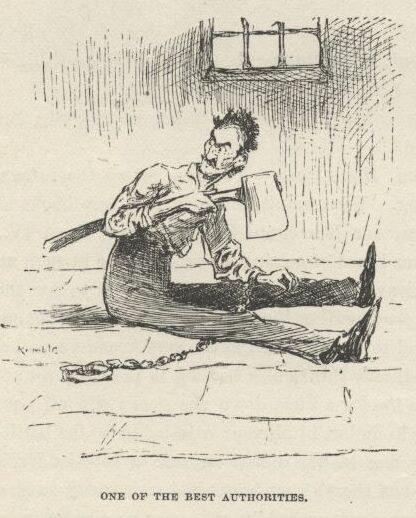
"Well, some of the best authorities has done it. They couldn't get the chain off, so they just cut their hand off and shoved. And a leg would be better still. But we got to let that go. There ain't necessity enough in this case; and, besides, Jim's a nigger, and wouldn't understand the reasons for it, and how it's the custom in Europe; so we'll let it go. But there's one thing—he can have a rope ladder; we can tear up our sheets and make him a rope ladder easy enough. And we can send it to him in a pie; it's mostly done that way. And I've et worse pies."
"Why, Tom Sawyer, how you talk," I says; "Jim ain't got no use for a rope ladder."
"He HAS got use for it. How YOU talk, you better say; you don't know nothing about it. He's GOT to have a rope ladder; they all do."
"What in the nation can he DO with it?"
"DO with it? He can hide it in his bed, can't he?" That's what they all do; and HE'S got to, too. Huck, you don't ever seem to want to do anything that's regular; you want to be starting something fresh all the time. S'pose he DON'T do nothing with it? ain't it there in his bed, for a clew, after he's gone? and don't you reckon they'll want clews? Of course they will. And you wouldn't leave them any? That would be a PRETTY howdy-do, WOULDN'T it! I never heard of such a thing."
"Well," I says, "if it's in the regulations, and he's got to have it, all right, let him have it; because I don't wish to go back on no regulations; but there's one thing, Tom Sawyer—if we go to tearing up our sheets to make Jim a rope ladder, we're going to get into trouble with Aunt Sally, just as sure as you're born. Now, the way I look at it, a hickry-bark ladder don't cost nothing, and don't waste nothing, and is just as good to load up a pie with, and hide in a straw tick, as any rag ladder you can start; and as for Jim, he ain't had no experience, and so he don't care what kind of a—"
"Oh, shucks, Huck Finn, if I was as ignorant as you I'd keep still—that's what I'D do. Who ever heard of a state prisoner escaping by a hickry-bark ladder? Why, it's perfectly ridiculous."
"Well, all right, Tom, fix it your own way; but if you'll take my advice, you'll let me borrow a sheet off of the clothesline."
He said that would do. And that gave him another idea, and he says:
"Borrow a shirt, too."
"What do we want of a shirt, Tom?"
"Want it for Jim to keep a journal on."
"Journal your granny—JIM can't write."
"S'pose he CAN'T write—he can make marks on the shirt, can't he, if we make him a pen out of an old pewter spoon or a piece of an old iron barrel-hoop?"
"Why, Tom, we can pull a feather out of a goose and make him a better one; and quicker, too."
"PRISONERS don't have geese running around the donjon-keep to pull pens out of, you muggins. They ALWAYS make their pens out of the hardest, toughest, troublesomest piece of old brass candlestick or something like that they can get their hands on; and it takes them weeks and weeks and months and months to file it out, too, because they've got to do it by rubbing it on the wall. THEY wouldn't use a goose-quill if they had it. It ain't regular."
"Well, then, what'll we make him the ink out of?"
"Many makes it out of iron-rust and tears; but that's the common sort and women; the best authorities uses their own blood. Jim can do that; and when he wants to send any little common ordinary mysterious message to let the world know where he's captivated, he can write it on the bottom of a tin plate with a fork and throw it out of the window. The Iron Mask always done that, and it's a blame' good way, too."
"Jim ain't got no tin plates. They feed him in a pan."
"That ain't nothing; we can get him some."
"Can't nobody READ his plates."
"That ain't got anything to DO with it, Huck Finn. All HE'S got to do is to write on the plate and throw it out. You don't HAVE to be able to read it. Why, half the time you can't read anything a prisoner writes on a tin plate, or anywhere else."
"Well, then, what's the sense in wasting the plates?"
"Why, blame it all, it ain't the PRISONER'S plates."
"But it's SOMEBODY'S plates, ain't it?"
"Well, spos'n it is? What does the PRISONER care whose—"
He broke off there, because we heard the breakfast-horn blowing. So we cleared out for the house.
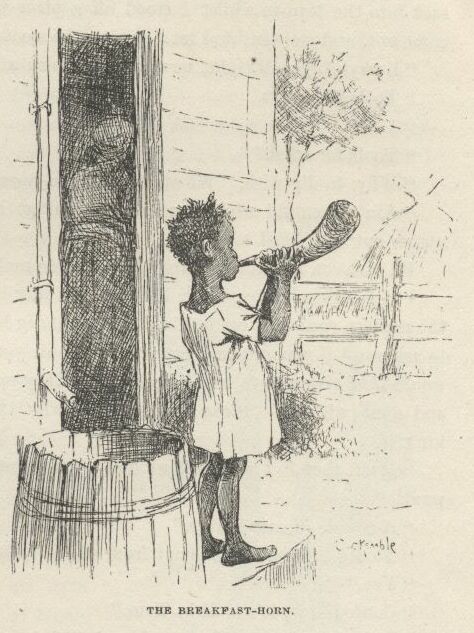
Along during the morning I borrowed a sheet and a white shirt off of the clothes-line; and I found an old sack and put them in it, and we went down and got the fox-fire, and put that in too. I called it borrowing, because that was what pap always called it; but Tom said it warn't borrowing, it was stealing. He said we was representing prisoners; and prisoners don't care how they get a thing so they get it, and nobody don't blame them for it, either. It ain't no crime in a prisoner to steal the thing he needs to get away with, Tom said; it's his right; and so, as long as we was representing a prisoner, we had a perfect right to steal anything on this place we had the least use for to get ourselves out of prison with. He said if we warn't prisoners it would be a very different thing, and nobody but a mean, ornery person would steal when he warn't a prisoner. So we allowed we would steal everything there was that come handy. And yet he made a mighty fuss, one day, after that, when I stole a watermelon out of the nigger-patch and eat it; and he made me go and give the niggers a dime without telling them what it was for. Tom said that what he meant was, we could steal anything we NEEDED. Well, I says, I needed the watermelon. But he said I didn't need it to get out of prison with; there's where the difference was. He said if I'd a wanted it to hide a knife in, and smuggle it to Jim to kill the seneskal with, it would a been all right. So I let it go at that, though I couldn't see no advantage in my representing a prisoner if I got to set down and chaw over a lot of gold-leaf distinctions like that every time I see a chance to hog a watermelon.
Well, as I was saying, we waited that morning till everybody was settled down to business, and nobody in sight around the yard; then Tom he carried the sack into the lean-to whilst I stood off a piece to keep watch. By and by he come out, and we went and set down on the woodpile to talk. He says:
"Everything's all right now except tools; and that's easy fixed."
"Tools?" I says.
"Yes."
"Tools for what?"
"Why, to dig with. We ain't a-going to GNAW him out, are we?"
"Ain't them old crippled picks and things in there good enough to dig a nigger out with?" I says.
He turns on me, looking pitying enough to make a body cry, and says:
"Huck Finn, did you EVER hear of a prisoner having picks and shovels, and all the modern conveniences in his wardrobe to dig himself out with? Now I want to ask you—if you got any reasonableness in you at all—what kind of a show would THAT give him to be a hero? Why, they might as well lend him the key and done with it. Picks and shovels—why, they wouldn't furnish 'em to a king."
"Well, then," I says, "if we don't want the picks and shovels, what do we want?"
"A couple of case-knives."
"To dig the foundations out from under that cabin with?"
"Yes."
"Confound it, it's foolish, Tom."
"It don't make no difference how foolish it is, it's the RIGHT way—and it's the regular way. And there ain't no OTHER way, that ever I heard of, and I've read all the books that gives any information about these things. They always dig out with a case-knife—and not through dirt, mind you; generly it's through solid rock. And it takes them weeks and weeks and weeks, and for ever and ever. Why, look at one of them prisoners in the bottom dungeon of the Castle Deef, in the harbor of Marseilles, that dug himself out that way; how long was HE at it, you reckon?"
"I don't know."
"Well, guess."
"I don't know. A month and a half."
"THIRTY-SEVEN YEAR—and he come out in China. THAT'S the kind. I wish the bottom of THIS fortress was solid rock."
"JIM don't know nobody in China."
"What's THAT got to do with it? Neither did that other fellow. But you're always a-wandering off on a side issue. Why can't you stick to the main point?"
"All right—I don't care where he comes out, so he COMES out; and Jim don't, either, I reckon. But there's one thing, anyway—Jim's too old to be dug out with a case-knife. He won't last."
"Yes he will LAST, too. You don't reckon it's going to take thirty-seven years to dig out through a DIRT foundation, do you?"
"How long will it take, Tom?"
"Well, we can't resk being as long as we ought to, because it mayn't take very long for Uncle Silas to hear from down there by New Orleans. He'll hear Jim ain't from there. Then his next move will be to advertise Jim, or something like that. So we can't resk being as long digging him out as we ought to. By rights I reckon we ought to be a couple of years; but we can't. Things being so uncertain, what I recommend is this: that we really dig right in, as quick as we can; and after that, we can LET ON, to ourselves, that we was at it thirty-seven years. Then we can snatch him out and rush him away the first time there's an alarm. Yes, I reckon that 'll be the best way."
"Now, there's SENSE in that," I says. "Letting on don't cost nothing; letting on ain't no trouble; and if it's any object, I don't mind letting on we was at it a hundred and fifty year. It wouldn't strain me none, after I got my hand in. So I'll mosey along now, and smouch a couple of case-knives."
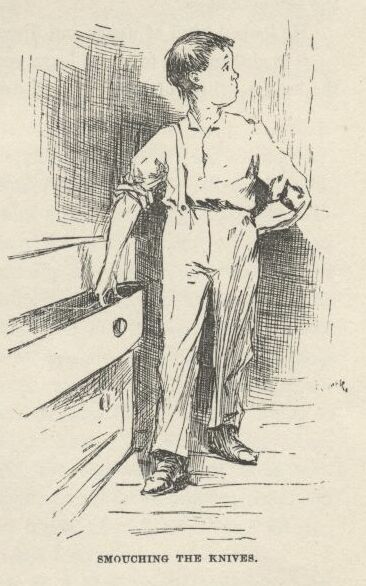
"Smouch three," he says; "we want one to make a saw out of."
"Tom, if it ain't unregular and irreligious to sejest it," I says, "there's an old rusty saw-blade around yonder sticking under the weather-boarding behind the smoke-house."
He looked kind of weary and discouraged-like, and says:
"It ain't no use to try to learn you nothing, Huck. Run along and smouch the knives—three of them." So I done it.
End of the Project Gutenberg EBook of Adventures of Huckleberry Finn, Part 7
by Mark Twain (Samuel Clemens)
*** END OF THIS PROJECT GUTENBERG EBOOK HUCKLEBERRY FINN, PART 7. ***
***** This file should be named 7106-h.htm or 7106-h.zip *****
This and all associated files of various formats will be found in:
https://www.gutenberg.org/7/1/0/7106/
Produced by David Widger
Updated editions will replace the previous one--the old editions
will be renamed.
Creating the works from public domain print editions means that no
one owns a United States copyright in these works, so the Foundation
(and you!) can copy and distribute it in the United States without
permission and without paying copyright royalties. Special rules,
set forth in the General Terms of Use part of this license, apply to
copying and distributing Project Gutenberg-tm electronic works to
protect the PROJECT GUTENBERG-tm concept and trademark. Project
Gutenberg is a registered trademark, and may not be used if you
charge for the eBooks, unless you receive specific permission. If you
do not charge anything for copies of this eBook, complying with the
rules is very easy. You may use this eBook for nearly any purpose
such as creation of derivative works, reports, performances and
research. They may be modified and printed and given away--you may do
practically ANYTHING with public domain eBooks. Redistribution is
subject to the trademark license, especially commercial
redistribution.
*** START: FULL LICENSE ***
THE FULL PROJECT GUTENBERG LICENSE
PLEASE READ THIS BEFORE YOU DISTRIBUTE OR USE THIS WORK
To protect the Project Gutenberg-tm mission of promoting the free
distribution of electronic works, by using or distributing this work
(or any other work associated in any way with the phrase "Project
Gutenberg"), you agree to comply with all the terms of the Full Project
Gutenberg-tm License (available with this file or online at
https://gutenberg.org/license).
Section 1. General Terms of Use and Redistributing Project Gutenberg-tm
electronic works
1.A. By reading or using any part of this Project Gutenberg-tm
electronic work, you indicate that you have read, understand, agree to
and accept all the terms of this license and intellectual property
(trademark/copyright) agreement. If you do not agree to abide by all
the terms of this agreement, you must cease using and return or destroy
all copies of Project Gutenberg-tm electronic works in your possession.
If you paid a fee for obtaining a copy of or access to a Project
Gutenberg-tm electronic work and you do not agree to be bound by the
terms of this agreement, you may obtain a refund from the person or
entity to whom you paid the fee as set forth in paragraph 1.E.8.
1.B. "Project Gutenberg" is a registered trademark. It may only be
used on or associated in any way with an electronic work by people who
agree to be bound by the terms of this agreement. There are a few
things that you can do with most Project Gutenberg-tm electronic works
even without complying with the full terms of this agreement. See
paragraph 1.C below. There are a lot of things you can do with Project
Gutenberg-tm electronic works if you follow the terms of this agreement
and help preserve free future access to Project Gutenberg-tm electronic
works. See paragraph 1.E below.
1.C. The Project Gutenberg Literary Archive Foundation ("the Foundation"
or PGLAF), owns a compilation copyright in the collection of Project
Gutenberg-tm electronic works. Nearly all the individual works in the
collection are in the public domain in the United States. If an
individual work is in the public domain in the United States and you are
located in the United States, we do not claim a right to prevent you from
copying, distributing, performing, displaying or creating derivative
works based on the work as long as all references to Project Gutenberg
are removed. Of course, we hope that you will support the Project
Gutenberg-tm mission of promoting free access to electronic works by
freely sharing Project Gutenberg-tm works in compliance with the terms of
this agreement for keeping the Project Gutenberg-tm name associated with
the work. You can easily comply with the terms of this agreement by
keeping this work in the same format with its attached full Project
Gutenberg-tm License when you share it without charge with others.
1.D. The copyright laws of the place where you are located also govern
what you can do with this work. Copyright laws in most countries are in
a constant state of change. If you are outside the United States, check
the laws of your country in addition to the terms of this agreement
before downloading, copying, displaying, performing, distributing or
creating derivative works based on this work or any other Project
Gutenberg-tm work. The Foundation makes no representations concerning
the copyright status of any work in any country outside the United
States.
1.E. Unless you have removed all references to Project Gutenberg:
1.E.1. The following sentence, with active links to, or other immediate
access to, the full Project Gutenberg-tm License must appear prominently
whenever any copy of a Project Gutenberg-tm work (any work on which the
phrase "Project Gutenberg" appears, or with which the phrase "Project
Gutenberg" is associated) is accessed, displayed, performed, viewed,
copied or distributed:
This eBook is for the use of anyone anywhere at no cost and with
almost no restrictions whatsoever. You may copy it, give it away or
re-use it under the terms of the Project Gutenberg License included
with this eBook or online at www.gutenberg.org
1.E.2. If an individual Project Gutenberg-tm electronic work is derived
from the public domain (does not contain a notice indicating that it is
posted with permission of the copyright holder), the work can be copied
and distributed to anyone in the United States without paying any fees
or charges. If you are redistributing or providing access to a work
with the phrase "Project Gutenberg" associated with or appearing on the
work, you must comply either with the requirements of paragraphs 1.E.1
through 1.E.7 or obtain permission for the use of the work and the
Project Gutenberg-tm trademark as set forth in paragraphs 1.E.8 or
1.E.9.
1.E.3. If an individual Project Gutenberg-tm electronic work is posted
with the permission of the copyright holder, your use and distribution
must comply with both paragraphs 1.E.1 through 1.E.7 and any additional
terms imposed by the copyright holder. Additional terms will be linked
to the Project Gutenberg-tm License for all works posted with the
permission of the copyright holder found at the beginning of this work.
1.E.4. Do not unlink or detach or remove the full Project Gutenberg-tm
License terms from this work, or any files containing a part of this
work or any other work associated with Project Gutenberg-tm.
1.E.5. Do not copy, display, perform, distribute or redistribute this
electronic work, or any part of this electronic work, without
prominently displaying the sentence set forth in paragraph 1.E.1 with
active links or immediate access to the full terms of the Project
Gutenberg-tm License.
1.E.6. You may convert to and distribute this work in any binary,
compressed, marked up, nonproprietary or proprietary form, including any
word processing or hypertext form. However, if you provide access to or
distribute copies of a Project Gutenberg-tm work in a format other than
"Plain Vanilla ASCII" or other format used in the official version
posted on the official Project Gutenberg-tm web site (www.gutenberg.org),
you must, at no additional cost, fee or expense to the user, provide a
copy, a means of exporting a copy, or a means of obtaining a copy upon
request, of the work in its original "Plain Vanilla ASCII" or other
form. Any alternate format must include the full Project Gutenberg-tm
License as specified in paragraph 1.E.1.
1.E.7. Do not charge a fee for access to, viewing, displaying,
performing, copying or distributing any Project Gutenberg-tm works
unless you comply with paragraph 1.E.8 or 1.E.9.
1.E.8. You may charge a reasonable fee for copies of or providing
access to or distributing Project Gutenberg-tm electronic works provided
that
- You pay a royalty fee of 20% of the gross profits you derive from
the use of Project Gutenberg-tm works calculated using the method
you already use to calculate your applicable taxes. The fee is
owed to the owner of the Project Gutenberg-tm trademark, but he
has agreed to donate royalties under this paragraph to the
Project Gutenberg Literary Archive Foundation. Royalty payments
must be paid within 60 days following each date on which you
prepare (or are legally required to prepare) your periodic tax
returns. Royalty payments should be clearly marked as such and
sent to the Project Gutenberg Literary Archive Foundation at the
address specified in Section 4, "Information about donations to
the Project Gutenberg Literary Archive Foundation."
- You provide a full refund of any money paid by a user who notifies
you in writing (or by e-mail) within 30 days of receipt that s/he
does not agree to the terms of the full Project Gutenberg-tm
License. You must require such a user to return or
destroy all copies of the works possessed in a physical medium
and discontinue all use of and all access to other copies of
Project Gutenberg-tm works.
- You provide, in accordance with paragraph 1.F.3, a full refund of any
money paid for a work or a replacement copy, if a defect in the
electronic work is discovered and reported to you within 90 days
of receipt of the work.
- You comply with all other terms of this agreement for free
distribution of Project Gutenberg-tm works.
1.E.9. If you wish to charge a fee or distribute a Project Gutenberg-tm
electronic work or group of works on different terms than are set
forth in this agreement, you must obtain permission in writing from
both the Project Gutenberg Literary Archive Foundation and Michael
Hart, the owner of the Project Gutenberg-tm trademark. Contact the
Foundation as set forth in Section 3 below.
1.F.
1.F.1. Project Gutenberg volunteers and employees expend considerable
effort to identify, do copyright research on, transcribe and proofread
public domain works in creating the Project Gutenberg-tm
collection. Despite these efforts, Project Gutenberg-tm electronic
works, and the medium on which they may be stored, may contain
"Defects," such as, but not limited to, incomplete, inaccurate or
corrupt data, transcription errors, a copyright or other intellectual
property infringement, a defective or damaged disk or other medium, a
computer virus, or computer codes that damage or cannot be read by
your equipment.
1.F.2. LIMITED WARRANTY, DISCLAIMER OF DAMAGES - Except for the "Right
of Replacement or Refund" described in paragraph 1.F.3, the Project
Gutenberg Literary Archive Foundation, the owner of the Project
Gutenberg-tm trademark, and any other party distributing a Project
Gutenberg-tm electronic work under this agreement, disclaim all
liability to you for damages, costs and expenses, including legal
fees. YOU AGREE THAT YOU HAVE NO REMEDIES FOR NEGLIGENCE, STRICT
LIABILITY, BREACH OF WARRANTY OR BREACH OF CONTRACT EXCEPT THOSE
PROVIDED IN PARAGRAPH F3. YOU AGREE THAT THE FOUNDATION, THE
TRADEMARK OWNER, AND ANY DISTRIBUTOR UNDER THIS AGREEMENT WILL NOT BE
LIABLE TO YOU FOR ACTUAL, DIRECT, INDIRECT, CONSEQUENTIAL, PUNITIVE OR
INCIDENTAL DAMAGES EVEN IF YOU GIVE NOTICE OF THE POSSIBILITY OF SUCH
DAMAGE.
1.F.3. LIMITED RIGHT OF REPLACEMENT OR REFUND - If you discover a
defect in this electronic work within 90 days of receiving it, you can
receive a refund of the money (if any) you paid for it by sending a
written explanation to the person you received the work from. If you
received the work on a physical medium, you must return the medium with
your written explanation. The person or entity that provided you with
the defective work may elect to provide a replacement copy in lieu of a
refund. If you received the work electronically, the person or entity
providing it to you may choose to give you a second opportunity to
receive the work electronically in lieu of a refund. If the second copy
is also defective, you may demand a refund in writing without further
opportunities to fix the problem.
1.F.4. Except for the limited right of replacement or refund set forth
in paragraph 1.F.3, this work is provided to you 'AS-IS' WITH NO OTHER
WARRANTIES OF ANY KIND, EXPRESS OR IMPLIED, INCLUDING BUT NOT LIMITED TO
WARRANTIES OF MERCHANTIBILITY OR FITNESS FOR ANY PURPOSE.
1.F.5. Some states do not allow disclaimers of certain implied
warranties or the exclusion or limitation of certain types of damages.
If any disclaimer or limitation set forth in this agreement violates the
law of the state applicable to this agreement, the agreement shall be
interpreted to make the maximum disclaimer or limitation permitted by
the applicable state law. The invalidity or unenforceability of any
provision of this agreement shall not void the remaining provisions.
1.F.6. INDEMNITY - You agree to indemnify and hold the Foundation, the
trademark owner, any agent or employee of the Foundation, anyone
providing copies of Project Gutenberg-tm electronic works in accordance
with this agreement, and any volunteers associated with the production,
promotion and distribution of Project Gutenberg-tm electronic works,
harmless from all liability, costs and expenses, including legal fees,
that arise directly or indirectly from any of the following which you do
or cause to occur: (a) distribution of this or any Project Gutenberg-tm
work, (b) alteration, modification, or additions or deletions to any
Project Gutenberg-tm work, and (c) any Defect you cause.
Section 2. Information about the Mission of Project Gutenberg-tm
Project Gutenberg-tm is synonymous with the free distribution of
electronic works in formats readable by the widest variety of computers
including obsolete, old, middle-aged and new computers. It exists
because of the efforts of hundreds of volunteers and donations from
people in all walks of life.
Volunteers and financial support to provide volunteers with the
assistance they need, is critical to reaching Project Gutenberg-tm's
goals and ensuring that the Project Gutenberg-tm collection will
remain freely available for generations to come. In 2001, the Project
Gutenberg Literary Archive Foundation was created to provide a secure
and permanent future for Project Gutenberg-tm and future generations.
To learn more about the Project Gutenberg Literary Archive Foundation
and how your efforts and donations can help, see Sections 3 and 4
and the Foundation web page at https://www.pglaf.org.
Section 3. Information about the Project Gutenberg Literary Archive
Foundation
The Project Gutenberg Literary Archive Foundation is a non profit
501(c)(3) educational corporation organized under the laws of the
state of Mississippi and granted tax exempt status by the Internal
Revenue Service. The Foundation's EIN or federal tax identification
number is 64-6221541. Its 501(c)(3) letter is posted at
https://pglaf.org/fundraising. Contributions to the Project Gutenberg
Literary Archive Foundation are tax deductible to the full extent
permitted by U.S. federal laws and your state's laws.
The Foundation's principal office is located at 4557 Melan Dr. S.
Fairbanks, AK, 99712., but its volunteers and employees are scattered
throughout numerous locations. Its business office is located at
809 North 1500 West, Salt Lake City, UT 84116, (801) 596-1887, email
[email protected]. Email contact links and up to date contact
information can be found at the Foundation's web site and official
page at https://pglaf.org
For additional contact information:
Dr. Gregory B. Newby
Chief Executive and Director
[email protected]
Section 4. Information about Donations to the Project Gutenberg
Literary Archive Foundation
Project Gutenberg-tm depends upon and cannot survive without wide
spread public support and donations to carry out its mission of
increasing the number of public domain and licensed works that can be
freely distributed in machine readable form accessible by the widest
array of equipment including outdated equipment. Many small donations
($1 to $5,000) are particularly important to maintaining tax exempt
status with the IRS.
The Foundation is committed to complying with the laws regulating
charities and charitable donations in all 50 states of the United
States. Compliance requirements are not uniform and it takes a
considerable effort, much paperwork and many fees to meet and keep up
with these requirements. We do not solicit donations in locations
where we have not received written confirmation of compliance. To
SEND DONATIONS or determine the status of compliance for any
particular state visit https://pglaf.org
While we cannot and do not solicit contributions from states where we
have not met the solicitation requirements, we know of no prohibition
against accepting unsolicited donations from donors in such states who
approach us with offers to donate.
International donations are gratefully accepted, but we cannot make
any statements concerning tax treatment of donations received from
outside the United States. U.S. laws alone swamp our small staff.
Please check the Project Gutenberg Web pages for current donation
methods and addresses. Donations are accepted in a number of other
ways including including checks, online payments and credit card
donations. To donate, please visit: https://pglaf.org/donate
Section 5. General Information About Project Gutenberg-tm electronic
works.
Professor Michael S. Hart was the originator of the Project Gutenberg-tm
concept of a library of electronic works that could be freely shared
with anyone. For thirty years, he produced and distributed Project
Gutenberg-tm eBooks with only a loose network of volunteer support.
Project Gutenberg-tm eBooks are often created from several printed
editions, all of which are confirmed as Public Domain in the U.S.
unless a copyright notice is included. Thus, we do not necessarily
keep eBooks in compliance with any particular paper edition.
Most people start at our Web site which has the main PG search facility:
https://www.gutenberg.org
This Web site includes information about Project Gutenberg-tm,
including how to make donations to the Project Gutenberg Literary
Archive Foundation, how to help produce our new eBooks, and how to
subscribe to our email newsletter to hear about new eBooks.